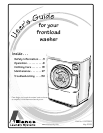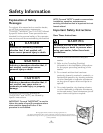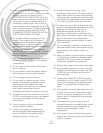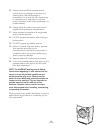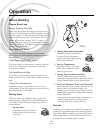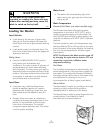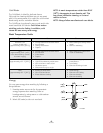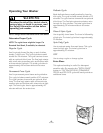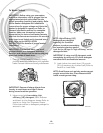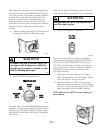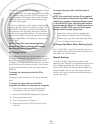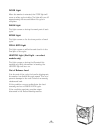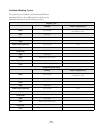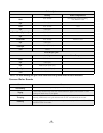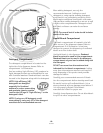
-8-
802753
Cold Water
The Cold Wash is ideal for delicate items.
Although its cleaning abilities are not as great
with hot or warm water, it is useful for colors that
bleed easily and for sensitive fabrics.
The Cold Rinse is optional in every cycle and is the
most beneficial for fabrics. Cold rinses reduce
wrinkling and color fading. In addition, cold
rinses will save money and energy.
NOTE: In wash temperatures colder than 60
o
F
(16
o
C), detergents do not dissolve well. This
may cause ineffective cleaning, or lint and
residue to form.
NOTE: Always follow manufacturer’s care labels.
Wash Temperature Guide
Energy
You can save energy when washing by following a
few guidelines:
1. Heating water accounts for the greatest
energy expense when washing. Save on
heating water by using warm or cold washes
as well as cold rinses.
2. Wash full loads, but do not overload.
Water Temperature Use Comments
BOOSTED HOT
(select models only)
(approximately 140°F [60°C])
• Sturdy whites and colorfast items
•Work clothes
• Heavily soiled items
•Diapers
• Best cleaning for heavily soiled
items
• Best for sanitizing
HOT
(approximately 120°F [49°C]
or as determined by outside
hot water supply)
• Sturdy whites and colorfast items
•Work clothes
•Soiled items
•Diapers
• Best cleaning for soiled items
• Good for sanitizing
WARM
(approximately 100º F [38°C])
• Rinsing of some items
• Light and moderately soiled items
• Non-colorfast or dark colors
• Permanent press
• Silks, woolens, nylon, acrylic
• Reduces wrinkling in permanent
press fabrics
• Less fading
• Reduces shrinking in knits
COLD
(approximately 60º F [16°C])
• Rinsing of most items
• Non-colorfast fabrics
• Extra delicate clothing
• Saves energy
• Reduces color fading
• Reduces wrinkling
• Reduces shrinking
120
o
F
(49
o
C)
100
o
F
(38
o
C)
60
o
F
(16
o
C)
HOT
WARM
COLD
TLW1994N



